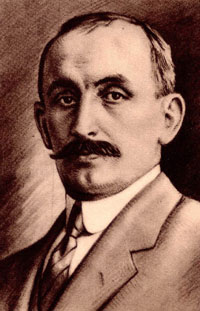Andon Zako ÇAJUPI

Andon Zako Çajupi (1866-1930) was born in Sheper, a village in the Upper Zagoria region of southern Albania, as the son of a rich tobacco merchant, Harito Çako, who did business in Kavala and Egypt. The young Andon Zako, who usually preferred this spelling of his surname and was later to adopt the pseudonym Çajupi, attended Greek-language schools in the region and in 1882 emigrated to Egypt where he studied for five years at the French lycée ‘Sainte Catherine des Lazaristes’ in Alexandria. In 1887, he went on to study law at the University of Geneva. Çajupi completed his law degree on 24 October 1892 and remained in Switzerland for two or three more years where he married a girl named Eugénie and where his son Stefan was born. Eugénie died in about 1892, a tragic loss for the poet, and Çajupi returned to Kavala to leave his small son in the charge of his mother Zoica. About 1894/1895, Çajupi returned to Egypt and articled for three years with a German law firm in Cairo. His legal career came to a swift conclusion, however, when he made the strategic mistake of defending a French company in a dispute against the interests of the khedive. Financially independent, however, Çajupi bore this professional calamity with ease. He withdrew to his villa in Heliopolis near Cairo and devoted himself subsequently to literature and to the consolidation of the thriving Albanian nationalist movement in Egypt. In the years following Albanian independence, Çajupi continued to play an active role in the Albanian community on the Nile, organized as it was into various patriotic clubs and societies at odds with one another over political issues. The poet died at his home in Heliopolis on 11 July 1930. His remains were transferred to Albania in 1958.
The most significant phase of Çajupi’s literary and nationalist activities was from 1898 to 1912. By 1902 he was an active member of the Albanian Fraternity of Egypt (Vëllazëria e Egjiptit ) and that same year published the poetry volume for which he is best remembered: Baba-Tomorri, Cairo 1902 (Father Tomorr). This collection, named after Mt. Tomorr in central Albania, the Parnassus of Albanian mythology, contains light verse on mostly nationalist themes and is divided into three sections: 1) Fatherland, 2) Love, and 3) True and False Tales. The work was an immediate success. Indeed no volume of Albanian poetry had proven so popular among Albanians at home and abroad since the collections of Naim Frashëri .
Though there are many technical imperfections in his poems, their straightforward octosyllabic rhythms reminiscent of southern Albanian folksongs, their unequivocal messages and their patriotic inspiration made them extremely popular both with adults and children, and proclaimed Çajupi the most important Albanian poet since Naim Frashëri.
Çajupi was also a playwright, author of a verse tragedy on Scanderbeg entitled Burr’ i dheut (The earthly hero) written in 1907. This was followed by a one-act original comedy Pas vdekjes (After death), written in 1910 and printed, like the former play, in 1937 by Sofokli Çapi. Another drama in verse, which remained unpublished during his lifetime, was the four-act situation comedy Katërmbëdhjetë vjeç dhëndër (A bridegroom at fourteen).
|
BACK

